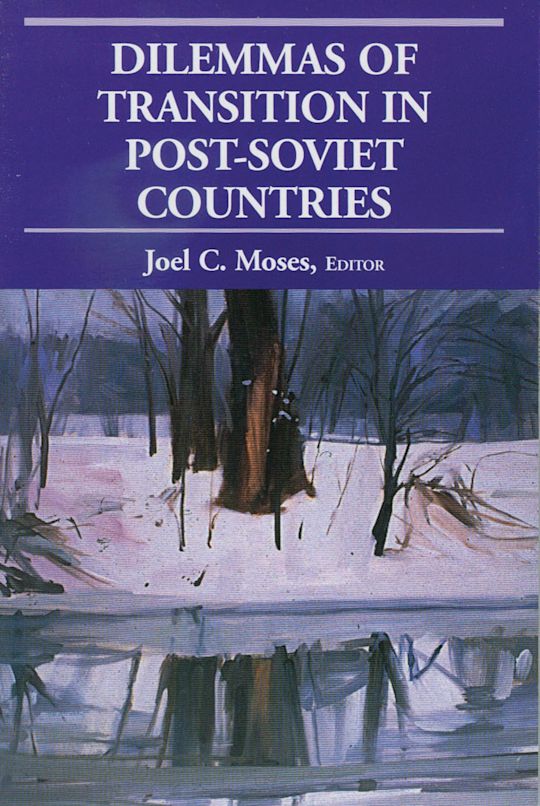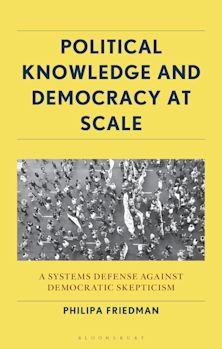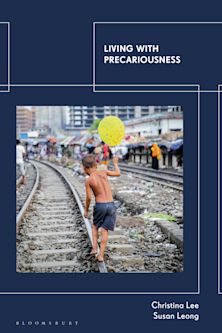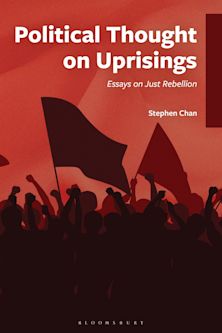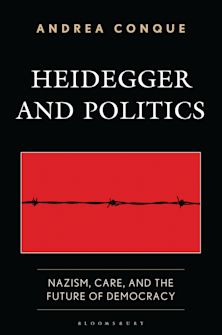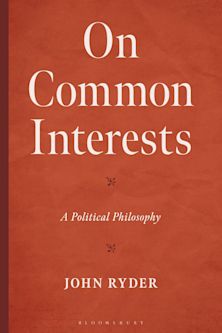- Home
- ACADEMIC
- Politics & International Relations
- Political Theory and Philosophy
- Dilemmas of Transition in Post-Soviet Countries
Dilemmas of Transition in Post-Soviet Countries
Dilemmas of Transition in Post-Soviet Countries
For information on how we process your data, read our Privacy Policy
Thank you. We will email you when this book is available to order
You must sign in to add this item to your wishlist. Please sign in or create an account
Description
Exploring the tensions inherent in transition, this perceptive book offers a wide-ranging overview of the impact of democracy and capitalism on the former Soviet republics. Leading scholars assess the region's daunting problems in the key realms of privatization, democratization, foreign investment, agrarian reform, local governance, and market economics. Their analysis is enriched with a wealth of original data based on field research in Russia, Lithuania, and Kyrgystan. The contributors argue that the central dilemma facing all these fledgling countries is the inherent contradiction between the immediate pursuit of privatization and foreign investment and the long-term policy goal of democratization. The book focuses especially on how the Communist past and its authoritarian legacy still powerfully hinder economic transformation in ways that build public support for and legitimacy of democratic processes and institutions. Offering both theoretical and comparative perspectives on the far-reaching implications of nation-building and democratic transition, this valuable study will enable both students and scholars to comprehend the unique difficulties of transition.
Table of Contents
Part 2 Chapter 1: Dilemmas of Transition in Post-Soviet Countries
Chapter 3 The Russian Scenario of 1998–2001
Chapter 4 Origins of the Dilemma
Chapter 5 Foreign Investment, Privatization, and Democratization
Chapter 6 Conclustion
Part 7 Chapter 2: Neoliberalism and Market Reforms in Rural Russia
Chapter 8 The State and the Rural Sector: Conceptual Models
Chapter 9 Neoliberalism and Market Reforms
Chapter 10 The Consequences of State Withdrawal
Chapter 11 The Politics of State Withdrawal
Chapter 12 Trends under Putin
Chapter 13 Conclusion
Part 14 Chapter 3: Winding Down? International Assistance to the Former Soviet Union
Chapter 15 Aid Conditionalities
Chapter 16 Conditions on Bilateral Assistance to the Former Soviet Union
Chapter 17 International Assistance in the Putin Era.
Chapter 18 Conclusion
Part 19 Chapter 4: Economic Resources and Political Power at the Local Level in Post-Soviet Russia
Chapter 20 Local Government in the Soviet Union
Chapter 21 Local Government in Post-Soviet Russia
Chapter 22 Conclusions
Chapter 23 More Recent Trends
Part 24 Chapter 5: Privatization and Democratization in Lithuania: A Case Study of Who Benefits in Siauliai
Chapter 25 Who Benefits?
Chapter 26 Privatization in Siauliai: The Economic Consequences
Chapter 27 Privatization in Siauliai: The Political Consequences
Chapter 28 Denial of Voice?
Chapter 29 Siauliai's Urban Regime
Chapter 30 Siauliai's Urban Regime in the 2000s
Chapter 31 Implications for Theory
Part 32 Chapter 6: Do Russia's Regions Really Want Outside Investment? Special Economic Zones and "Off-Shores" in Post-Soviet Russia
Chapter 33 Special Economic Zones in Russia
Chapter 34 Internal "Off-Shores"
Chapter 35 Federal Policy Toward Free Economic Zones and Off-Shores
Part 36 Chapter 7: The Personal Risks of Party Development
Chapter 37 Parties in the Post-Soviet Context
Chapter 38 Impediments to Party Development: The Activists' Accounts
Chapter 39 Limited Economic Autonomy
Chapter 40 Current Professions
Chapter 41 Regional Employment Opportunities
Chapter 42 Sources of Economic Autonomy
Chapter 43 Samara and Ul'ianovsk
Chapter 44 Osh and Naryn
Chapter 45 Market Reform and Democratization
Product details
| Published | 01 Jan 2003 |
|---|---|
| Format | Ebook (Epub & Mobi) |
| Edition | 1st |
| Extent | 202 |
| ISBN | 9780742577060 |
| Imprint | Rowman & Littlefield Publishers |
| Publisher | Bloomsbury Publishing |









